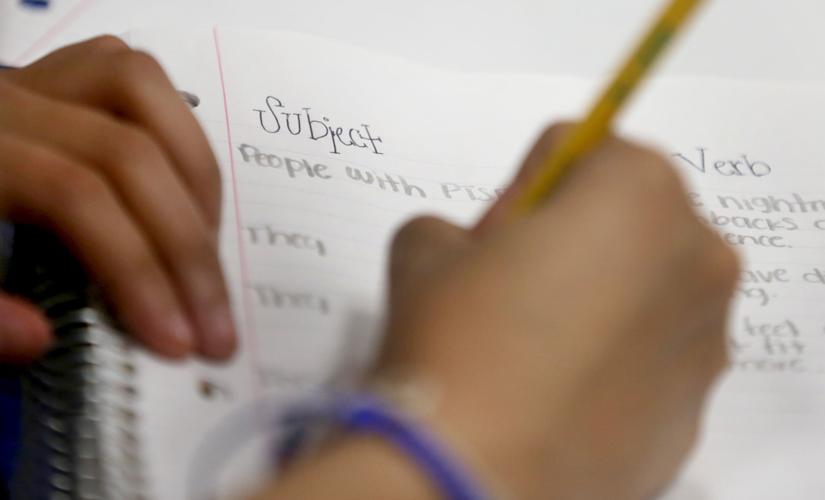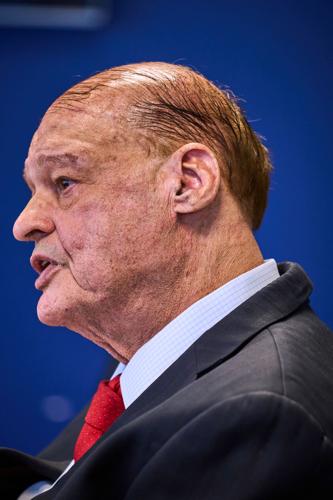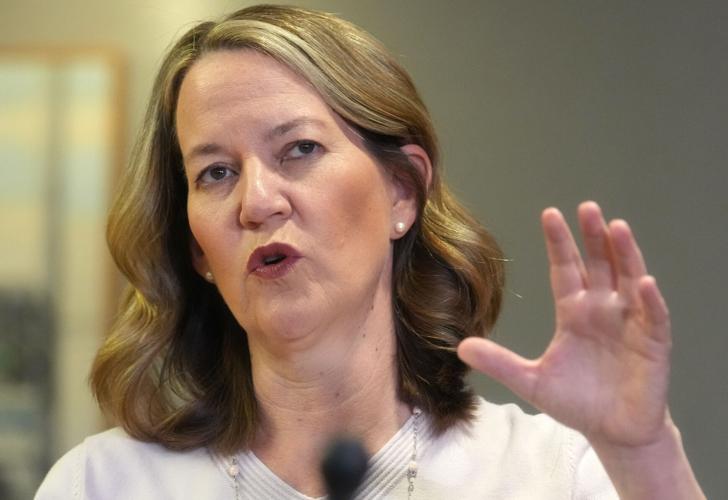Arizona Attorney General Kris Mayes says state schools chief Tom Horne has no authority to cut off funds to schools that don’t use “structured English immersion’’ to teach students who aren’t proficient in the language.
In a formal opinion issued Monday, Democrat Mayes said only the state Board of Education has the authority to declare that a school district is not complying with a 2000 voter-approved mandate that all children “shall be taught English by being taught in English and all children shall be placed in English language classrooms.’’
The opinion comes as Horne, a Republican, announced last month that any schools teaching “English language learners’’ in what has come to be known as a 50-50 dual-language model are breaking the law.

Tom Horne, Arizona superintendent of public instruction
In a letter to school districts, Horne said schools that don’t use immersion programs could lose access to special funds to teach English. He said the law also allows any parent to sue any school board member or any administrator responsible for violating the 2000 measure, Proposition 203, and that individual will be held personally liable for damages.
Mayes, however, pointed out that the Legislature in 2019 reduced the amount of time students must spend in structured English immersion classes and gave the state Board of Education flexibility to develop alternatives. One of the alternatives is the “dual language model’’ that Horne contends is illegal.
On one hand, Mayes sidestepped the question of whether that model complies with Proposition 203’s requirements. She said that is a question of fact and not law.

Attorney General Kris Mayes
But the attorney general said the state board did conclude that dual language programs are acceptable, that school districts “remain entitled to rely on that approval,’’ and that Horne can’t do anything about it.
Horne is unlikely to accede to Mayes’ opinion and back off of his threats.
“A court challenge to that opinion is expected,’’ said his spokesman, Doug Nick.
That may be only one of the legal fights Horne will wage to keep English immersion as the only acceptable method of teaching the language.
Nick said Horne thinks the Legislature itself acted illegally when it approved the 2019 law giving the state board more authority to adopt alternate programs.
He said once voters approved Proposition 203, that measure was covered by the Voter Protection Act, a constitutional amendment that precludes lawmakers from repealing or tinkering with anything approved at the ballot box. The only amendments permitted are those that “further the purpose’’ of the original ballot measure.
And while Mayes cites her legal research, Horne is citing his own: a memo issued May 31 by Hannah Nies, general counsel to the Arizona Legislative Council, a legal arm of the Legislature. She said a dual language model that allows students to be taught subject matter in a language other than English “likely violates Proposition 203.’’
The original initiative created a requirement for a rigid bloc of instruction of at least four hours a day in a classroom with only those students not proficient in English.
Theoretically, that was designed to provide proficiency in just one year. But the Department of Education found in 2018 that just 14% of “English language learner’’ (ELL) students were found to be proficient enough to leave the program.
That led to questions of about why the students were being segregated and whether the language instruction meant they were not keeping up with their peers in other subjects.
A 2010 study by researchers at Arizona State University said ELL students are “physically, socially, and educationally isolated from their non-ELL peers.’’
In 2019, Republican Gov. Doug Ducey signed the legislation allowing the state board to adopt and approve alternate “research-based’’ models that involve two hours a day, giving school officials more flexibility in how to schedule that time. It allows classrooms mixed with both students whose native language is English as well as those from homes where that is not the case.
But Nick said Horne is convinced that what many schools are now doing just doesn’t work.
“We have data that show that the English proficiency rate for dual-language learners is between 4 and 6%,’’ he said. “That’s obviously very poor.’’
By contrast, Nick said, structured English immersion was strictly enforced the first time Horne was state schools chief, between 2003 and 2011.
“That percentage was somewhere in the neighborhood of more like 36%,’’ he said.
Horne campaigned for a new term in 2022 by promising to enforce the requirements for structured English immersion.
Numbers aside, Nick said schools have no choice but to comply with Proposition 203 and its requirements for structured English immersion. That goes to Horne’s contention that whatever lawmakers did in 2019 to loosen the requirements is illegal and unenforceable.
There was an effort in 2020 to put a measure on the ballot that would have resolved the matter by removing the restrictions on how English can be taught.
HCR2001 would have replaced Proposition 203 with a requirement for public schools to provide dual language programs for both native and non-native English speakers. It spelled out that schools must provide “effective and appropriate instructional methods.’’
It was approved by the House Education Committee on a 10-1 margin but died when it could not get the required hearing by the Rules Committee.
Regina Lewandowski of Estes Elementary School was named the 2022 Arizona English Learner Teacher of the Year by the Arizona Department of Education. In this video, Principal Colleen Frederick and Lewandowski's students talk about the teacher's contributions to the school. Video courtesy of the Marana Unified School District.







